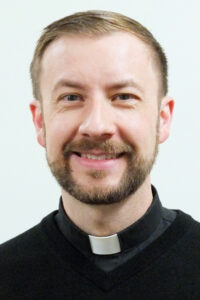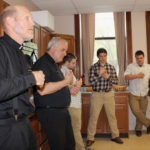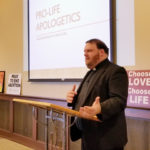By Fr. Thom Hennen
From Thanksgiving until just after Valentine’s Day we get a lot of calls and e-mails to reserve dates for weddings. This is “engagement season” and, naturally, many of our alumni who met at St. Ambrose University want to come back here to get married in our chapel.

But something I have noticed in my last two years here as chaplain has been how far into the future some of these engagements are extending. In my past parish experience it seemed like engagements could be anywhere between 12 months to maybe a year and a half. Now it seems that a one-year engagement is rare and that this period is stretching to a year and a half to two years and sometimes beyond.
Part of this is undoubtedly driven by the “modern wedding machine,” in which venues for receptions are booking further and further into the future. I imagine other services associated with weddings (photographers, caterers, etc.) are also booking further out. In a way, the “church piece” is for many couples the least pressing part of the whole puzzle and, sadly, sometimes the least prioritized.
All of this got me wondering about the overall effect of this on the consent of the parties entering into marriage. It was one thing to call off a wedding when engagements were a year or less and when weddings were typically much simpler and much less expensive. But what is the level of freedom of a couple who got engaged two years or more prior to the wedding date, lined up wedding coordinators, photographers, sent out “save the date” postcards and paid a deposit on a reception venue? And that’s probably just the start of their investment of time, energy and money. If a prospective bride or groom has misgivings about the marriage a few weeks or even months before the wedding, does she or he really feel free to say, “time out?”
I also wonder if, given the length of some engagements, whether engagement has become merely the last phase of the courtship or discernment process, rather than a period of immediate preparation for marriage.
Thinking back to my time as vocation director for the diocese, I can’t help but compare this to the process of formation for the priesthood and specifically the ordination to the transitional diaconate. (This is also the point at which the promise of celibacy is made.) If the man to be ordained, or the diocese or the seminary formation faculty, don’t have an overwhelming sense that he should proceed to priestly ordination in due time, then he should not be ordained a deacon.
While the diaconate is its own order and should not be seen as simply the last “stepping stone” to priesthood, this period of at least six months between diaconate and priesthood is also a more immediate preparation for priestly ordination. In other words, the discernment part of the process should be largely concluded. In the same way, when a couple gets engaged to be married, their discernment should be largely done, as they now begin a more intense but not overly drawn-out preparation for marriage.
It’s not just the length and purpose of the engagement but also the expectations surrounding the celebration of the wedding itself that should, I think, be reconsidered to allow for greater freedom and focus on the sacrament.
Recently, in going through some of my parents’ things after their passing, my sister and I found the newspaper clipping of their wedding announcement. We were surprised to learn that they were married on a Monday. Who gets married on a Monday? And yet, I’m sure at that time (1954) you may have just had to take what was available. Also, my dad wore a simple suit (my mother, of course, had a traditional wedding dress), they had just two witnesses (the best man and the maid of honor), and the nuptial Mass was followed by a simple reception in the parish hall. Even without all the pomp, they were married nearly 65 years.
Also, I recall several years ago when I was studying Spanish in Mexico. I walked into a church in a small town only to discover that three couples were getting married during the usual Sunday Mass with the whole community present. This would be unheard of here.
Perhaps we need to reexamine the ways — at least societally — that we have approached weddings. As I often tell couples I am preparing for marriage, I absolutely want them to have a beautiful wedding, and I will do everything that I can within the rites of the church to ensure that. More importantly, I want them to have a beautiful marriage, and that starts with their right understanding of marriage and their free “yes.”
I’m not saying we should go back to six-month engagements or abandon all of the conventions of the modern American wedding, but simply that we keep in front of us what is most important. Couples, however long engaged or invested in their wedding day, should not let all of their planning for their special day paint them into a corner.
(Father Thom Hennen is chaplain at St. Ambrose University in Davenport and associate director of vocations for the Diocese of Davenport.)











